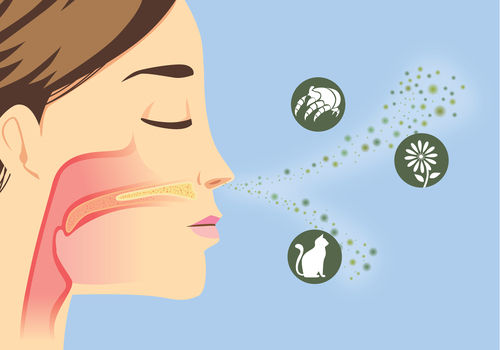Respiratory Health
Can Asthma Get Worse During Summers?
4 min read
By Apollo 24|7, Published on - 02 May 2022, Updated on - 24 May 2023
Share this article
0
5 likes

The simple one-word answer is ‘YES’, but that will not resolve any of the curious scenarios in your mind. Our best option is to explore further and get some facts straight.
Asthma is a non-communicable, respiratory disease. People with asthma suffer from an inflamed airway tube. When the tube comes in contact with an allergen, the muscles around the tubes start to tighten as a reflex and get filled with mucus impairing the movement of air. This narrowing of the airways feels like choking, further triggering symptoms like breathlessness, wheezing, coughing, and pain in the chest.
To understand how summer worsens asthma, we need to understand asthma and the allergens that trigger it while defining its types. The most common types of asthma are:
- Allergic asthma is triggered by free-floating allergens that make the body release chemicals to attack the substance, resulting in asthma symptoms.
- Seasonal asthma is a type of allergic asthma that is triggered by seasonal allergens like pollen.
- Occupational asthma is caused by exposure to substances such as dust, gases, and fumes from chemicals that are an integral part of one’s job. The long term exposure makes your immune system sensitive to substances.
- Non-allergic asthma is triggered by elements like cold, heat, humidity, stress, exercise, pollution, smoke, infections, such as colds, the flu, and sinus infections.
- Exercise-induced asthma is triggered by prolonged vigorous physical exertion, one may only show symptoms only during exercising.
- Difficult asthma is confirmed asthma through diagnoses, within this type the symptoms and lung functions are difficult to improve on without treatment.
- Severe asthma is the most life-threatening type of asthma and is difficult to be managed even with high doses of medications.
- Brittle asthma is a rare form of severe asthma that requires a patient to be hospitalised in order to control its symptoms. It is believed to be triggered by animals, certain types of fungus, dust mites and some food items. Brittle asthma affects only 1% of the people with asthma. Brittle asthma can further be categorised as:
- Type 1 is more likely to affect women and the age group of 15 to 55. It can result in sudden life-threatening asthma attacks.
- Type 2 doesn’t discriminate between genders and can affect your breathing throughout the day.

Summers triggering asthma is an overlap of allergic and seasonal asthma, the season raises the risk of asthma by 23% mainly due to the dryness that sets the allergens like dust particles, pollens etc. on loose, and the situation in hot humid regions gets worse, given the moisture content that makes air inert, trapping the allergens raising the risk for asthma patients. Another trigger is the rise in temperature. According to some experts, inhaling hot air can increase the inflammation of the already inflamed airways bringing in the classic asthma symptoms.
What are the levels of asthma?
No two people show similarities in symptoms as the intensity of the disease can vary. Here are the four different levels of asthma:
1. Mild intermittent asthma
- Symptoms appear less than twice a week
- No breathing challenge between attacks
- Attack or flare-ups are short
- Night-time symptoms are limited to less than twice a month
2. Mild persistent asthma
- Symptoms appear less than twice a week, but not more than once a day
- Activity levels affected by attacks
- Symptoms at night-time are more than twice a month
3. Moderate persistent asthma
- Symptoms occur every day
- Medication is needed every day
- Attacks or flare-ups happen twice a week or more
- Night-time symptoms occur more than once a week
4. Severe persistent asthma
- Persistent symptoms
- Decrease in physical activity
- Frequent flare-ups
- Night-time symptoms become frequent
Causes of asthma
The experts point to varied reasons for an individual to suffer from asthma early on in their childhood or develop it later in life. But, it's never that one reason that leads a person to develop symptoms but a combination of a few, some are listed below:
- Genetics: It may simply be part of your genetics, you may receive the disease in your gene pool from your parents or grandparents.
- Allergies: People with allergic conditions show higher risks of developing asthma. Some examples of those allergic conditions include eczema and hay fever.
- Environmental triggers: Environmental factors like allergens and irritants play equally crucial roles in developing asthma.
- Other factors: Premature birth, prolonged exposure to tobacco smoke and obesity early on in life can affect the development of the lungs, raising the risk of asthma.
Things you can do to keep asthma at bay this summer season!
Summers may not be a favourite for a lot of us but there isn’t much anyone of us can do to change the climate cycle entirely! However, here are a few pointers that can prevent asthma flare-ups this summer:
- Identify your triggers
- Don’t engage in vigorous activities
- Keep your medications handy
- Plan your day after checking the weather report
- Keep emergency numbers handy
- Wear mask or nasal filters almost all the time
Asthma is a non-curable, chronic condition, which means it’s a lifelong challenge and can only be managed. With new advancements in medical technology, inhalers are the safest and most convenient means to curb asthma. People with asthma may not have to give up on their quality of life if they commit to a few safety measures and prescription discipline.
Respiratory Health
Leave Comment
Recommended for you

Respiratory Health
What Are The Common Asthma Triggers?
Asthma causes inflammation and narrowing of the airways, making the airways overreact to certain triggers leading to breathing difficulties, wheezing, and other symptoms.

Respiratory Health
6 Warning Signs of Lung Damage
An infection, tumour, or tissue disorder can lead to lung damage. Early signs and symptoms of lung damage include cough, shortness of breath, chest pain, blood in the cough, and difficulty in daily activities. One should consult a doctor for early diagnosis and treatment.

Respiratory Health
How to Keep Your Lungs Healthy During Diwali
Bursting of firecrackers during Diwali leave behind toxic particles that are dangerous for everyone, especially those people living with pre-existing respiratory conditions such as asthma, chronic obstructive pulmonary disease (COPD) and bronchitis.
Subscribe
Sign up for our free Health Library Daily Newsletter
Get doctor-approved health tips, news, and more.
Visual Stories

Managing COPD During the COVID-19 Pandemic
Tap to continue exploring
Recommended for you

Respiratory Health
What Are The Common Asthma Triggers?
Asthma causes inflammation and narrowing of the airways, making the airways overreact to certain triggers leading to breathing difficulties, wheezing, and other symptoms.

Respiratory Health
6 Warning Signs of Lung Damage
An infection, tumour, or tissue disorder can lead to lung damage. Early signs and symptoms of lung damage include cough, shortness of breath, chest pain, blood in the cough, and difficulty in daily activities. One should consult a doctor for early diagnosis and treatment.

Respiratory Health
How to Keep Your Lungs Healthy During Diwali
Bursting of firecrackers during Diwali leave behind toxic particles that are dangerous for everyone, especially those people living with pre-existing respiratory conditions such as asthma, chronic obstructive pulmonary disease (COPD) and bronchitis.